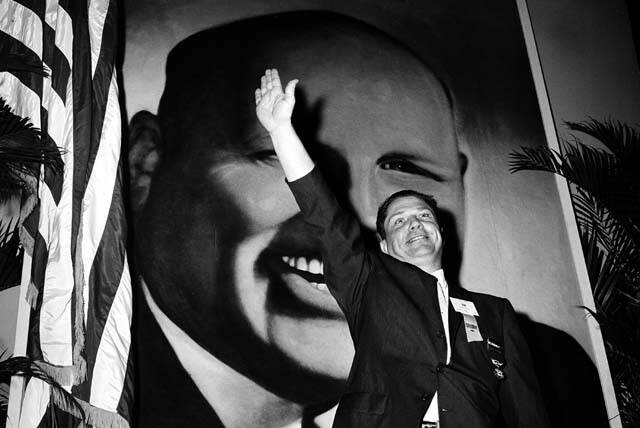Jimmy Hoffa’s role in developing Las Vegas

On July 30, 1975, legendary Teamsters Union leader Jimmy Hoffa was ready for a crucial meeting with mob bosses he hoped would pave the way for him to regain control of the nation’s most important labor organization.
Hoffa and his friends in the mob had played a big role in the development of Las Vegas through their control over the Teamsters Central States Pension Fund, and the millions of dollars in loans it extended to casinos.
The pension fund was the mob’s bank. It funded a long line of Strip casinos, including the Desert Inn, Caesars Palace, Dunes, Stardust, Circus Circus and the Aladdin.
Geoff Schumacher, vice president of exhibits and programs for The Mob Museum, says Hoffa was at the top of the Strip’s A-list.
“Everybody seemed to love, you know, Uncle Jimmy, and he was taken care of in the hotels,” Schumacher says. “He was in all of the elite circles in the city. And he, you know, he could make or break just about anybody in town, so he was very powerful.”
The charismatic Hoffa had lost control of the Teamsters after he was sent to prison in 1967 because of pension fund fraud and jury tampering convictions. He won an early release in 1971 … with a pardon from President Richard Nixon and was trying to make a comeback within the union.
Everybody seemed to love, you know, Uncle Jimmy, and he was taken care of in the hotels
Geoff Schumacher, The Mob Museum
In his heyday, Hoffa was fearless with the mob on his side. He stood up to U.S. Attorney General Robert Kennedy in the 1960s and turned the Teamsters into the most powerful union in the country.
“Hoffa always thought that he, or he always claimed that he would deal with the Mafia at arm’s distance,” says Dan Moldea, an investigative reporter and Hoffa expert. “You know, in my opinion, they owned him completely, lock, stock and barrel, owned him.”
But Hoffa’s campaign to take back the reins of the union was creating tension among his organized crime allies. Reputed Detroit Mafia street boss Anthony Giacalone, had persuaded Hoffa to show up for the meeting at the Machus Red Fox restaurant outside Detroit, one of Hoffa’s favorite places, to smooth things over.
Hoffa was told that New Jersey Teamsters leader Anthony Provenzano, a ranking member of New York’s Genovese crime family, would be there. The two men had been locked in a bitter feud since their days in prison together.
If Hoffa gained the mobster’s support, his future with the union would be much brighter.
But the meeting didn’t happen. Witnesses saw Hoffa in the parking lot talking to three unknown men in a 1974 Mercury Marquis that belonged to Giacalone’s son. Hoffa jumped into the back seat of the car and was never seen again.
Just what happened to the man who helped shape the Las Vegas Strip skyline remains one of this country’s biggest crime mysteries.
Part 2: Jimmy Hoffa’s Rise and Fall
Hoffa’s disappearance on that fateful day in July 1975 is the backdrop for the second episode in the Review-Journal’s second season of the popular, true crime podcast series, “Mobbed Up: The Fight for Las Vegas.”
Your host for season 2 is Review-Journal investigative reporter Jeff German, who has covered organized crime in the city for more than 40 years.
Where and how to listen
“Mobbed Up: The Fight for Las Vegas, Season 2” is available for free on all major podcasting platforms, including Apple Podcasts, Spotify, Google Podcasts and more.
Search for “Mobbed Up” on your preferred mobile podcasting app and tap “subscribe” or “follow,” or click here to listen to or click here to listen tothe series on the Review-Journal website.
Season One of “Mobbed Up,” published in summer 2020, chronicled the rise and fall of the mob in Las Vegas over the course of 11 episodes.